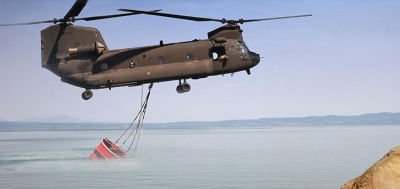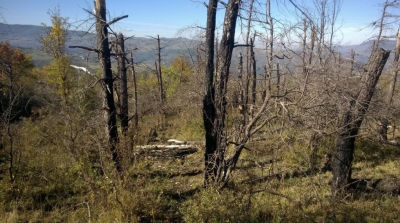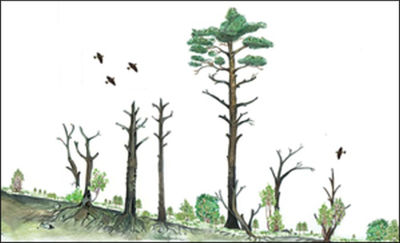
Mediterranean Garden Society

Mediterranean Garden Society

What can we do about Forest Fires?
by Brian Chatterton
Photographs to illustrate the article published in The Mediterranean Garden No. 114, October 2023
The photo at the top of this page shows a wild fire burning in the hills above Lake Trasimeno, Umbria, Italy (photo Perugia Today
Brian Chatterton is an olive grower from Umbria in central Italy. Formerly he was the Minister responsible for Country Fire Services in the South Australian Government. He writes:
Raising awareness
There have been severe forest fires throughout the Mediterranean region this summer as there were last year. I find it disappointing that governments in the region seem to accept this with resignation as an inevitable consequence of climate warming and have not taken action to mitigate the impact in future years. I come to the problem as a former Minister of Agriculture in South Australia where I had had responsibility for the Country Fire Services. That was many years ago, in the 1970s, and I am sure that we can do a lot better now with modern technology.
We all know that forest fires thrive in hot, dry, windy conditions but these effects need to be quantified and at a certain point an Extreme Fire Danger needs to be declared. In Greece this summer most of the fires were started by humans. Dry lightning can start fires but it is human carelessness or the failure of human systems such as power lines that cause most fires. Arsonists are a problem but not on the scale of the fires caused by human carelessness. The declaration of Extreme Fire Danger would trigger a national information campaign on radio and TV as well as road signs. With modern mobile networks it is possible to trigger warnings in hotels, camp sites and many other places with large numbers of people.
As well as these urgent messages there needs to be a continuous campaign throughout the summer highlighting the dangers of smoking, barbecues and fireworks.

A Canadair water bombs a fire in the Umbria countryside (Umbria Domani)
Simplified penalties
The Extreme Fire Danger message from all these outlets is that fires in the open under any circumstances whatsoever are strictly forbidden and that there are severe penalties for anyone who breaks the rules. This may require a revision of the law. At present the laws on fires during the summer are confusing and difficult to enforce. In the part of Italy where I live open fires are banned during the whole summer. Few people seem aware of this and in any case it makes the law look foolish if, as often happens, May is wet and the grass is green. The laws need to be simplified and publicised to start with and then enforced. Penalties should be set at a much higher level on Extreme Fire Days.
The Extreme Fire Danger declaration should also trigger a higher level of monitoring. Fire watchers on prominent hills or towers can spot fires quickly and this can be taken to a higher level with drones. Drones can also assist in detecting arsonists. Fire crews will be put on high alert.

A helicopter extinguishes a forest fire in Umbria, Italy (Vigile del Fuoco)
Cost of prevention and control
Before we go too far we need to examine the cost. There is a huge environmental crisis with global warming but there is not an endless pot of money to throw at it. I am acutely aware of this based on my experience in South Australia. South Australia is one of the larger Australian states – larger than most European countries but with a population less than that of a medium-sized European city. We had limited resources. People are concerned about fires. They want to help and they have the ability, if trained, to carry out a fully professional job but currently they are a grossly underused resource. The fire watchers, fire crews and especially the drone operators would be volunteers.
Exponential growth
Mathematicians please skip the next few lines but it is most important to understand the true meaning of “exponential growth” as it applies to fires. Let us start with a fire of 1 sq m. In 10 minutes it may be 2 sq m. Another 10 minutes it will be 4 sq m. Then 8 sq m within half an hour and 64 sq m in the first hour. In this example a small local unit would be able to control it if they arrived in an hour or so but these small units are not available.
There was a fire not far from here a couple of years ago that demonstrated this exponential growth in reality. It started with some garden rubbish being burnt during the summer. There was no local fire unit. The fire engine from the nearby town was called and arrived about two hours after the fire started. They failed to control it so the water bomber was called in. The bomber made three or four runs and controlled it with the help of the town unit. The cost of the bomber was €800,000. That would have paid for a local fire unit, a fire station and dozens of refill tanks around our local council area.

Forest fire spreading at Bevagna, Umbria (Perugia Today)
Local country fire units
Urban units are not suited to forest fires as they are not able to use steep, rough, forest tracks. Local units should be based on smaller vehicles – one-tonne four-wheel-drive trucks – and have a crew of perhaps three with a number of extra crews to reduce the time crews are on standby. These should be volunteers and semi-volunteers. The semi-volunteers would be the local council employees who move rapidly from, say, rubbish collection to the fire unit and who also volunteer after work and on weekends. Other volunteers could be local farmers, shopkeepers etc. The whole concept is now so much easier with mobile phones. On an Extreme Fire Day volunteers would be called up to be on standby for certain periods and then other teams would be called up. Those on standby drop everything and race to the fire station when called to a fire and the unit should be on the road in ten minutes.
I think it is most important that they are not paid except in exceptional circumstances. If a shopkeeper closes and hangs a sign on the door saying “Gone fire-fighting” business will benefit from the publicity but closing the shop for an extended period could be costly. Likewise council workers would receive their normal pay but not extra for the weekends.

Vigile del Fuoco fire fighter in Umbria (Vigile del Fuoco)
It is most important that women are encouraged to join the fire teams. This in not only for equality reasons but in many small towns the men work too far away to report as a crew in five or ten minutes. Often the women can do so.
These small units have a tank capacity of a few hundred litres but their effectiveness can be increased by a system of water tanks at strategic points where they can be used to refill the fire units quickly.
I don't want to give the impression that the water bombers are superfluous. They are vital for large fires but they have their problems too. In the case of our local fire they needed time to mobilise and fly down from their base. They do not operate when winds are too strong and in any case their effectiveness in increased when they operate in conjunction with ground-based crews.
Watch a video of coordinated air and ground based fire fighters in Umbria, Italy.
Command and control
This raises the question of coordination. I see the smaller units as based on a local council but they must be fully coordinated with the national service of urban units, water bombers and other fire services. They have to respond quickly and directly to a small local incident but keep reporting to a central management centre. They must be professionally trained. It sounds idealistic but in South Australia we fought forest fires with the Country Fire Service which was many local units based on farmers and local townspeople. There were also professional fire units from the Forestry Department and fire crews from the National Parks but they all managed to work together under a common command and control.
Cost of units
I claimed that my proposed volunteer country fire service was affordable yet the countries of the Mediterranean need thousands of these fire units which will cost millions of Euros. In South Australia we built our system over many decades and local volunteers not only provided the crews but raised half the cost of the equipment through donations. Here in Europe we have a crisis and cannot spend decades developing a response.
If the Mediterranean countries acted quickly and together they might be able to use their Recovery Funds for the purchase of the local fire units. In the longer term they should impose a Fire Prevention and Control tax on the owners of forests. Local communities are putting their time and potentially their lives into the effort to control fires and it seems only fair that the forest owners should contribute as well.
Training
These local fire units will have crews of volunteers who will need professional training for their own safety and to understand the tactics of fighting country fires. These are different from urban fires. There is rarely enough water to extinguish the fire and the aim is to control its spread and confine it to a smaller and smaller area where it can eventually be extinguished or will burn itself out.
We found in South Australia that the Country Fire Service volunteers were accepted by the professional teams as their complete equals.

Helicopter water bombs a fire in Umbria despite strong cross winds (Pexels)
TV images
TV news aims to entertain rather than providing accurate information. The images I have seen show the water bombers at work and in stark contrast desperate people trying to beat out fires with branches cut from trees. It is easy to dismiss their effort as trivial but remember the exponential story and a few litres of water at the early stages can be just as effective as the water bomber a day later. That is always assuming that a water bomber can be spared from other forest fires and that the wind is not so strong as to prevent flying.
We can however do better than the beaters. At a very low cost people can buy simple sprayers – the type you use in the garden – which will improve their fire-fighting effectiveness many times over. The local country fire units should organise a Fire Awareness Day in their town or village at the end of spring. This is a good opportunity to show people simple ways of preventing fires and extinguishing them as well as raising funds and encouraging people to volunteers as firefighters.
The news clips also show the tragic destruction of houses in the path of the fires. In Europe we are fortunate as most of the houses, unlike in Australia or the USA, are solid buildings with much less flammable wood in their construction. These houses can be made relatively fire-resistant at a low cost and residents can be provided with information during Fire Awareness Days.

Advice for forest management against fire (Umbria Regional Government)
A fire plan for the forest
I live on the edge of a large forest in Umbria in central Italy. This forest is dominated by oak, much less flammable than pine or some other species, but we have had serious fires at times. The forest belongs to a plethora of private owners which means there are no fire tracks or firebreaks as every owner thinks that it is someone else who should pay. In the longer term there needs to be an overall plan of access tracks and firebreaks but this will take time to negotiate and pay for through a Fire Prevention and Control Tax on forest holdings.
The crisis is immediate and we can take urgent action to protect country villages and isolated houses. Existing roads can be made more effective as firebreaks without a major impact on the environment. Roads allow human access which means more fires due to carelessness but their impact can be reduced and the roads can be useful in controlling large fires if the dry fuel on the ground is reduced for a few metres from the road.
With more research it may be possible to replace the more flammable trees along a road with more fire-resistant species but that is a much longer-term programme.

Military helicopter filling water bomb in a lake at Viterbo, Lazio (Ministero di Difesa
The military
In South Australia we operated without military assistance but in the Mediterranean region of Europe decades of neglect combined with climate warming that is accelerating faster than most people expected has made the crisis worse. The involvement of the military can be peripheral – the supply of personnel to relieve exhausted fire crews - or participatory. The war in Ukraine has shown the vital role played by drones and the military might find the monitoring of fires with drones a useful training exercise as well as vital for effective fire control. They might decide to go even further. For example, forgoing a single modern battle tank would give them sufficient funds to purchase several hundred fire trucks.

Ground layer recovery of pine forest after a fire in Basilicata (SISEF.ORG
After the fire
Reafforestation after a serious fire is a topic on its own and one where the various owners will take different approaches. In South Australia we sowed the burnt areas after the first autumn rains by air with a mixture of annual pasture legumes just to prevent erosion and the silting of streams and rivers. Later owners could develop their own longer-term solutions but immediate action was in the national interest and seeding from the air was the cheapest and most practical means of covering large areas.

The countries most affected by serious forest fires are those in the Mediterranean region (and of course in other mediterranean-climate regions). Climate warming seems to have accelerated faster in this area than predicted and faster than in other regions of the world. The governments of these countries seem to have adopted a policy of resignation yet there are many things that can be done to lessen the impact. It would be idealistic to believe that fires can be eliminated but their number and impact can be reduced substantially. Governments will want to carry out a cost-benefit assessment of local volunteer fire units but that will be impossible. These units will assist in the control of mega forest fires but valuing their precise contribution will be difficult. We shall never know how many fires were not started because of their awareness work nor how many of the small fires they extinguished would have become the monsters that have devoured huge areas of forest.
THE MEDITERRANEAN GARDEN is the registered trademark of The Mediterranean Garden Society in the European Union, Australia, and the United States of America